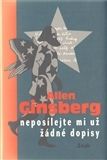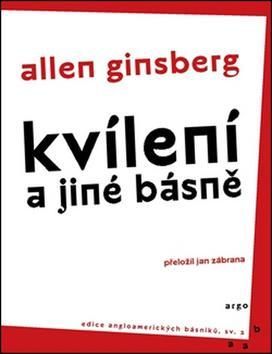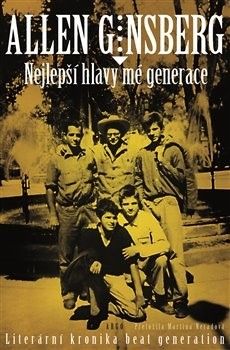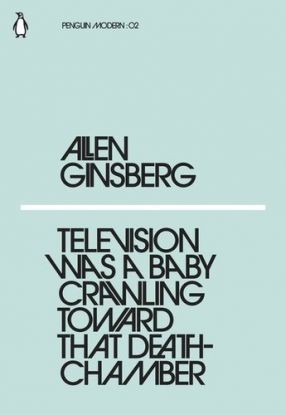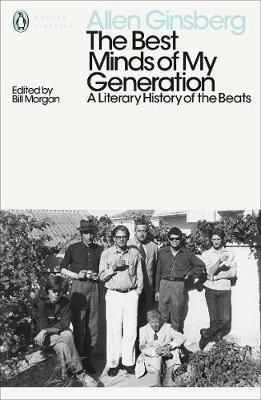Allen Ginsberg
autor
Neposílejte mi už žádné dopisy
Obsáhlý výbor poezie předního amerického básníka Allena Ginsberga, zakladatele literárního hnutí beat generation. Kniha obsahuje jak básně notoricky známé (Kvílení, Kádiš), tak i básně dosud v češtině nepublikované. Výbor Neposílejte mi už žádné dopisy podává ucelený přehled padesátileté Ginsbergovy tvorby v rozmezí let 1947 - 1997. Kniha je doprovázena autorovými ilustracemi.
Kvílení
Jedna z největších básnických sbírek 20. století, vpravdě kultovní Kvílení, vychází porpvé v češtině v samostatném svazku -- v klasickém překladu Jana Zábrany, který mohutně ovlivnil i moderní českou poezii. 2. svazek edice angloamerických básníků.
Nejlepší hlavy mé generace
V roce 1977, po dvaceti letech od vydání Ginsbergovy přelomové básně Kvílení a Kerouacova kultovního románu Na cestě, se Allen Ginsberg rozhodl vyučovat kurs věnovaný literárním dějinám beatnické generace. Ginsberg znal všechny zásadní postavy beatnického hnutí osobně a sám výrazně ovlivnil veřejné mínění ohledně beatnických básníků a spisovatelů; těžko by se našel komentátor či historik, který by dokázal hovořit o počátcích i vývoji beatnické scény se srovnatelnou zasvěceností. Rozumí se samo sebou, že přednášky v podání této legendární osobnosti byly okořeněné necenzurovanými postřehy a k akademické suchopárnosti měly daleko. V knize Nejlepší hlavy mé generace Ginsberg vychází především z vlastní zkušenosti, popisuje svá první setkání s Kerouacem, Burroughsem i dalšími členy beat generation a nabízí vskutku neotřelý, kritický a přitom nesmírně živý pohled na jedno z nejvýznamnějších literárních hnutí dvacátého století.
Na sklade 2Ks
26,02 €
27,39 €
Nélkülözhetetlen Allen Ginsberg
A beatgeneráció egyik legismertebb költője és írója, Allen Ginsberg nemcsak publikált művei, hanem emberi jogi aktivista tevékenysége révén is nemzetközi hírnévre tett szert, aki a szexuális forradalom, a buddhizmus és a keleti vallások, valamint a társadalmi normákkal való szembeszállás mellett szállt síkra - jóval megelőzve korát. Háborús tiltakozók, művészek, hippik, zenészek, punkok és politikai radikálisok dinamikus vezetője is volt.
Ez a könyv olyan anyagmozaikot gyűjt össze, amely Ginsberg szellemi tájképének teljes skáláját bemutatja. Költői remekművei, az Üvöltés és a Kaddish mellett kevésbé ismert és nehezen fellelhető dalai és prózái is szerepelnek, valamint William Burroughsszal és Jack Kerouackal folytatott személyes levelezése, és fényképek - amelyeket maga Ginsberg készített és feliratozott - barátairól és társairól.
Vytie
Kultové dielo kultového amerického básnika – predstaviteľa bítnickej generácie – v preklade Jána Buzássyho. Vo svojej dobe burcujúce a často drastické verše sú nielen vďaka svojmu odkazu, ale najmä vďaka originálnej výpovedi a neskrotnému duchu dosiaľ podnetné a aktuálne.
Vypredané
6,28 €
6,61 €
The Essential Ginsberg
Visionary poet Allen Ginsberg was one of the most influential cultural and literary figures of the 20th century, his face and political causes familiar to millions who had never even read his poetry. And yet he is a figure that remains little understood, especially how a troubled young man became one of the intellectual and artistic giants of the postwar era. He never published an autobiography or memoirs, believing that his body of work should suffice. The Essential Allen Ginsberg attempts a more intimate and rounded portrait of this iconic poet by bringing together for the first time his most memorable poetry but also journals, music, photographs and letters, much of it never before published.
Vypredané
16,10 €
16,95 €
Selected Poems : 1947-1995
Chosen by Ginsberg himself from nearly fifty years of experimental, groundbreaking verse, this selection, in his words, 'summarizes what I deem most honest, most penetrant of my writing', and includes lesser known and later works which go beyond his iconic 'Beat Generation' image. Presented chronologically, and ranging from early works such as "Paterson" (1949) to selections from "White Shroud" (1980-85) and "Cosmopolitan Greetings" (1986-92), and including the classic poems "Howl" (1955-56) and "Kaddish" (1959-60) as well as songs, recent uncollected poems and notes by the author, this volume brings together the most intensely personal verse of a great American poet - incandescent explorations that expand the consciousness with their breadth of vision and depth of humanity.
Vypredané
16,10 €
16,95 €
The Best Minds of My Generation
A unique history of the Beats, in the words of the movement's most central member, Allen Ginsberg, based on a seminal series of his lectures In 1977, twenty years after the publication of his landmark poem 'Howl' and Jack Kerouac's On the Road, Allen Ginsberg decided it was time to teach a course on the literary history of the Beat Generation. Through this course, Ginsberg saw an opportunity to present a complete history of Beat Literature and also to record and preserve his own personal stories and memories, ones that might have otherwise been lost to history. The result was a deeply intimate, candid and illuminating set of lectures, which form the basis of this book. Compiled and edited by renowned Beat scholar Bill Morgan, and with an introduction by Anne Waldman, The Best Minds of My Generation presents the lectures in edited form, revealing the Beats as Ginsberg knew them: friends, confidantes, literary mentors, and fellow revolutionaries.In The Best Minds of My Generation, Ginsberg gives us the convoluted origin story of the "Beat" idea, recounts anecdotes of meeting Kerouac, Burroughs, and other figures for the first time, elucidates the importance of music, and particularly jazz rhythms, to Beat writing, discusses their many influences - literary, pharmaceutical and spiritual - and paints a portrait of a group who were leading a literary revolution. A unique document that works both as historical record and unconventional memoir, The Best Minds of My Generation is a vivid, personal and eye-opening look at one of the most important literary movements of the twentieth century.
Vypredané
30,35 €
31,95 €
Television Was a Baby Crawling Toward That Deathchamber
'Wives in the avocados, babies in the tomatoes!-and you, Garcia Lorca, what were you doing by the watermelons?'
Profane and prophetic verses about sex, death, revolution and America by the great icon of Beat poetry.
Penguin Modern: fifty new books celebrating the pioneering spirit of the iconic Penguin Modern Classics series, with each one offering a concentrated hit of its contemporary, international flavour. Here are authors ranging from Kathy Acker to James Baldwin, Truman Capote to Stanislaw Lem and George Orwell to Shirley Jackson; essays radical and inspiring; poems moving and disturbing; stories surreal and fabulous; taking us from the deep South to modern Japan, New York's underground scene to the farthest reaches of outer space.
The Best Minds of My Generation
A unique history of the Beats, in the words of the movement's most central member, Allen Ginsberg, based on a seminal series of his lectures
In 1977, twenty years after the publication of his landmark poem 'Howl', Allen Ginsberg decided it was time to teach a course on the literary history of the Beat Generation - partly to preserve his own memories of those years. The Best Minds of My Generation presents the best of these candid, intimate and illuminating lectures, revealing Kerouac, Burroughs and the rest of the Beats as Ginsberg knew them: friends, confidantes, literary mentors and fellow visionaries in a group who started a revolution.
'Marvellous ... spellbinding ... preserving intact the story of the literary movement Ginsberg led, promoted and never ceased to embody' The New York Times Book Review
'An awesome exhaustive feat ... fascinatingly readable' Sunday Times
'Astonishingly intimate ... Full of penetrating insight and fascinating literary gossip, the book is a major contribution to the core Beat canon ... situates the Beats in cultural history in a way that no other exploration of their work does' San Francisco Chronicle
Kadiš
Mezi nejznámější básnické skladby Allena Ginsberga patří vedle Kvílení i Kadiš, velkolepý žalozpěv na básníkovu zesnulou matku, jejíž duševní choroba silně poznamenala jeho dětství a dospívání. Zárodky básně vznikly v Paříži v roce 1957, kde si Ginsberg společně s beatnickými tvůrci Gregorym Corsem, Peterem Orlovskym a později i Williamem S. Burroughsem prostřednictvím halucinogenů rozšiřoval sféru vědomí. V Kadiši se mu časem podařilo vypsat se z hlubokých traumat, přičemž k odemknutí bran podvědomí použil divotvorné klíče: valná část Kadiše vznikla pod vlivem morfinu a metamfetaminu a konečnou revizi provedl až po návratu z Peru, kde k tomu účelu požil ayahuasku neboli yagé.
Výmluvné jsou názvy dalších básní ve sbírce, například Meskalin, Kyselina lysergová, Ether či Rajský plyn; autor v nich opět vymítá ducha Naomi Ginsbergové, lamentuje nad iluzorností univerza, zakouší pocity tvůrčího zmaru i extázi z duchovního prozření a v psychedelickém proudu vědomí ze sebe nechává volně řinout vize, nářky, chvalozpěvy i obavy ze zániku smrtelného těla aby k nám po šedesáti letech skrze ony širokodeché verše stále živě promlouval jeho duch.
Básnická sbírka Kadiš a jiné básně (Kaddish and Other Poems), kterou Allen Ginsberg vydal v roce 1961 u Lawrence Ferlinghettiho v nakladatelství City Lights Books, obsahuje jeho básně z konce padesátých let (19581960) v již klasickém překladu Jana Zábrany. Čtyři dosud nepřeložené básně pak přeložil Bob Hýsek.
Howl Kaddish and Other Poems
Allen Ginsberg was the bard of the beat generation, and Howl, Kaddish and Other Poems is a collection of his finest work published in Penguin Modern Classics, including 'Howl', whose vindication at an obscenity trial was a watershed moment in twentieth-century history.
'I saw the best minds of my generation destroyed by madness, starving hysterical naked'
Beat movement icon and visionary poet, Allen Ginsberg broke boundaries with his fearless, pyrotechnic verse. This new collection brings together the famous poems that made his name as a defining figure of the counterculture. They include the apocalyptic 'Howl', which became the subject of an obscenity trial when it was first published in 1956; the moving lament for his dead mother, 'Kaddish'; the searing indictment of his homeland, 'America'; and the confessional 'Mescaline'. Dark, ecstatic and rhapsodic, they show why Ginsberg was one of the most influential poets of the twentieth century.
Vypredané
11,35 €
11,95 €
Nejlepší hlavy mé generace
V roce 1977, po dvaceti letech od vydání Ginsbergovy přelomové básně Kvílení a Kerouacova kultovního románu Na cestě, se Allen Ginsberg rozhodl vyučovat kurs věnovaný literárním dějinám beatnické generace. Ginsberg znal všechny zásadní postavy beatnického hnutí osobně a sám výrazně ovlivnil veřejné mínění ohledně beatnických básníků a spisovatelů; těžko by se našel komentátor či historik, který by dokázal hovořit o počátcích i vývoji beatnické scény se srovnatelnou zasvěceností. Rozumí se samo sebou, že přednášky v podání této legendární osobnosti byly okořeněné necenzurovanými postřehy a k akademické suchopárnosti měly daleko. V knize Nejlepší hlavy mé generace Ginsberg vychází především z vlastní zkušenosti, popisuje svá první setkání s Kerouacem, Burroughsem i dalšími členy beat generation a nabízí vskutku neotřelý, kritický a přitom nesmírně živý pohled na jedno z nejvýznamnějších literárních hnutí dvacátého století.
Predaj skončil
17,06 €
Kadiš a jiné básně
Mezi nejznámější básnické skladby Allena Ginsberga patří vedle Kvílení i Kadiš, velkolepý žalozpěv na básníkovu zesnulou matku, jejíž duševní choroba silně poznamenala jeho dětství a dospívání.
Zárodky básně vznikly v Paříži v roce 1957, kde si Ginsberg společně s beatnickými tvůrci Gregorym Corsem, Peterem Orlovskym a později i Williamem S. Burroughsem prostřednictvím halucinogenů „rozšiřoval sféru vědomí“. V Kadiši se mu časem podařilo vypsat se z hlubokých traumat, přičemž k odemknutí bran podvědomí použil divotvorné klíče: valná část Kadiše vznikla pod vlivem morfinu a metamfetaminu a konečnou revizi provedl až po návratu z Peru, kde k tomu účelu požil ayahuasku neboli yagé. Výmluvné jsou názvy dalších básní ve sbírce, například „Meskalin“, „Kyselina lysergová“, „Ether“ či „Rajský plyn“; autor v nich opět vymítá ducha Naomi Ginsbergové, lamentuje nad iluzorností univerza, zakouší pocity tvůrčího zmaru i extázi z duchovního prozření a v psychedelickém proudu vědomí ze sebe nechává volně řinout vize, nářky, chvalozpěvy i obavy ze zániku smrtelného těla – aby k nám po šedesáti letech skrze ony širokodeché verše stále živě promlouval jeho duch.
Básnická sbírka Kadiš a jiné básně (Kaddish and Other Poems), kterou Allen Ginsberg vydal v roce 1961 u Lawrence Ferlinghettiho v nakladatelství City Lights Books, obsahuje jeho básně z konce padesátých let (1958–1960) v již klasickém překladu Jana Zábrany. Čtyři dosud nepřeložené básně pak přeložil Bob Hýsek.
Predaj skončil
6,76 €
Lacná kniha Kadiš (-90%)
Mezi nejznámější básnické skladby Allena Ginsberga patří vedle Kvílení i Kadiš, velkolepý žalozpěv na básníkovu zesnulou matku, jejíž duševní choroba silně poznamenala jeho dětství a dospívání. Zárodky básně vznikly v Paříži v roce 1957, kde si Ginsberg společně s beatnickými tvůrci Gregorym Corsem, Peterem Orlovskym a později i Williamem S. Burroughsem prostřednictvím halucinogenů rozšiřoval sféru vědomí. V Kadiši se mu časem podařilo vypsat se z hlubokých traumat, přičemž k odemknutí bran podvědomí použil divotvorné klíče: valná část Kadiše vznikla pod vlivem morfinu a metamfetaminu a konečnou revizi provedl až po návratu z Peru, kde k tomu účelu požil ayahuasku neboli yagé.
Výmluvné jsou názvy dalších básní ve sbírce, například Meskalin, Kyselina lysergová, Ether či Rajský plyn; autor v nich opět vymítá ducha Naomi Ginsbergové, lamentuje nad iluzorností univerza, zakouší pocity tvůrčího zmaru i extázi z duchovního prozření a v psychedelickém proudu vědomí ze sebe nechává volně řinout vize, nářky, chvalozpěvy i obavy ze zániku smrtelného těla aby k nám po šedesáti letech skrze ony širokodeché verše stále živě promlouval jeho duch.
Básnická sbírka Kadiš a jiné básně (Kaddish and Other Poems), kterou Allen Ginsberg vydal v roce 1961 u Lawrence Ferlinghettiho v nakladatelství City Lights Books, obsahuje jeho básně z konce padesátých let (19581960) v již klasickém překladu Jana Zábrany. Čtyři dosud nepřeložené básně pak přeložil Bob Hýsek.
Vypredané
0,93 €
9,31 €
dostupné aj ako:
